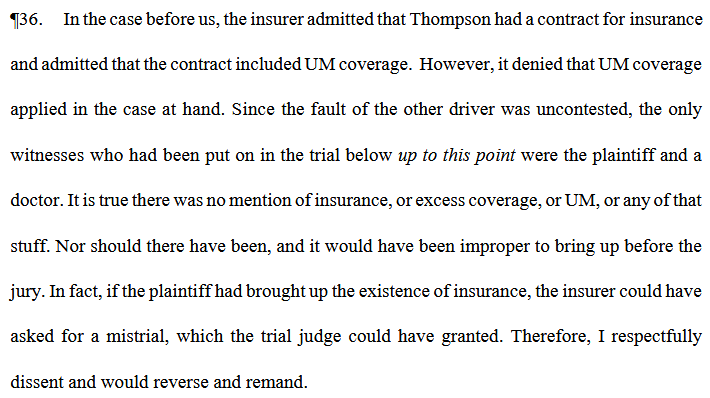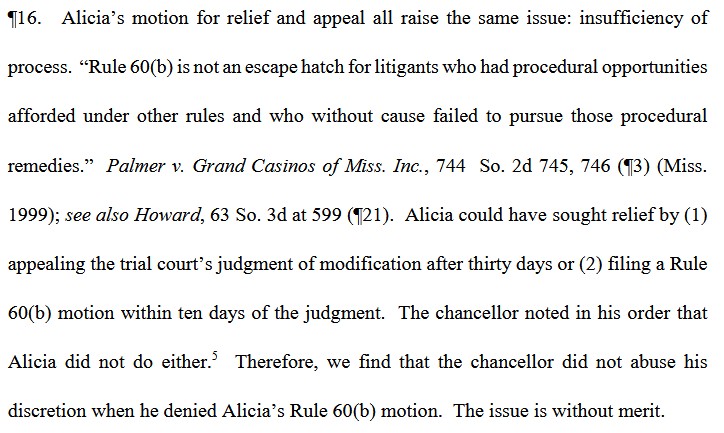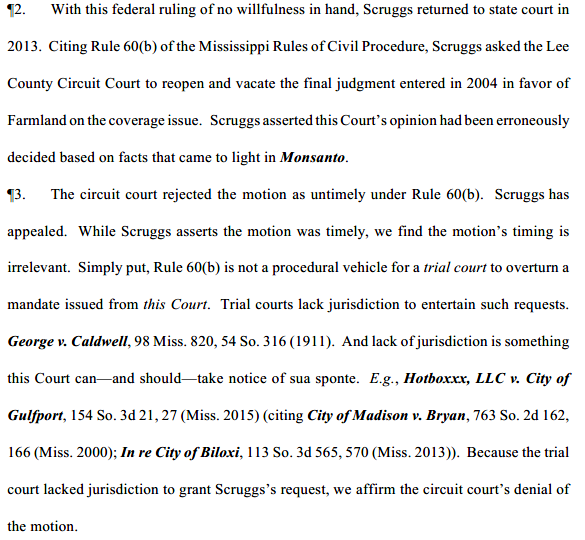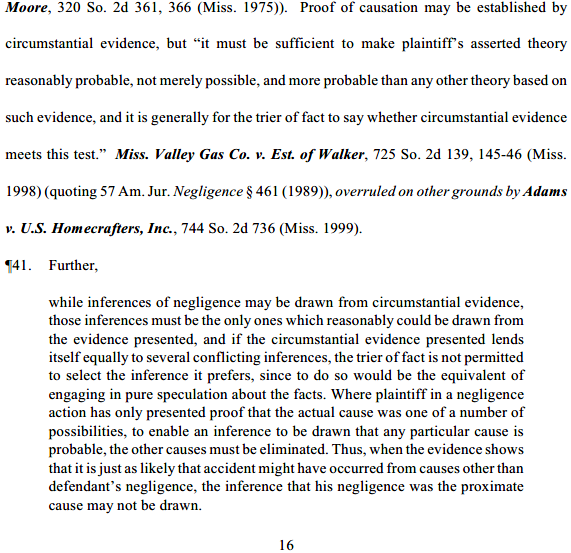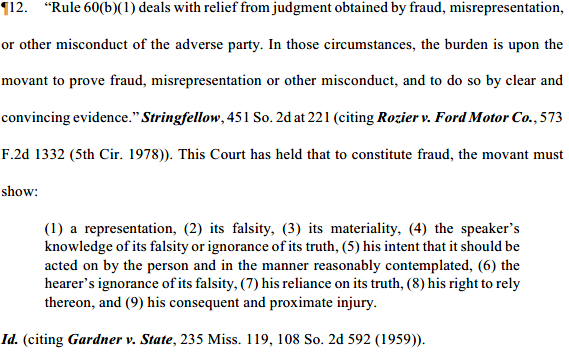The Mississippi Court of Appeals handed down six opinions last week and a hearty eleven today. There are some interesting cases in the mix and a summary of each is below.
May 13, 2025
May v. May, 2023-CA-01022-COA, consolidated with 2023-M-01401-COA (Civil – Domestic Relations)
Vacating the chancellor’s order of contempt for failure to pay child support but affirming his denial of the motion to recuse, holding that the chancery court did not have personal jurisdiction for purposes of a contempt ruling for want of service under Rule 81, but that although the chancellor erred in finding that the motion for recusal was untimely it was nevertheless within his discretion to deny it.
(9-1-0: Lawrence concurred in result only without writing)
Fortner v. IMS Engineers, Inc., 2023-CA-01170-COA (Civil – Personal Injury)
Affirming summary judgment in favor of a company that had been engaged to oversee and manage road improvement projects until about ten months before a fatal accident occurred, holding that there was no evidence that the company owed a duty of care once its involvement ended and the City took over the management role.
(8-1-0: Wilson concurred in part and in the result without writing; Carlton did not participate)
Horne v. Dolgencorp LLC, 2024-CA-00376-COA (Civil – Personal Injury)
Affirming summary judgment in a trip-and-fall case after a customer tripped on merchandise in an aisle, holding that there was no evidence that the store had actual or constructive knowledge of the presence of the dangerous condition.
(8-2: Westbrooks and McDonald dissented without writing)
Shipley v. Shipley, 2023-CA-00814-COA (Civil – Custody)
Affirming judgment modifying the custody arrangement by giving the mother sole physical and legal custody, holding that the chancellor did not err in modifying physical and legal custody based the mother’s relocation to Oregon, that the chancellor’s did not err by failing to consider the totality of the circumstances, that the chancellor did not give undue weight to one Albright factor, and that the argument that the chancellor erred by not sua sponte appointing a GAL to investigate allegations of abuse was procedurally barred, and declining to address child support in after ruling that the chancellor did not err in its custody decision.
(7-3: Wilson dissented, joined by Carlton and Emfinger)
Magyar v. Shiers, 2023-CA-00682-COA (Torts – Other)
Affirming bench trial decision finding the defendant liable for malicious prosecution and awarding compensatory and punitive damages, holding that there was evidence to support each element of malicious prosecution where the defendant had filed charging affidavits against the plaintiffs alleging that they were intentionally damaging his property by allowing sewage from a leaking septic system to run into his property but the justice court dismissed the charges for lack of evidence.
(10-0)
Mueller Industries, Inc. v. Waits, 2023-WC-00494-COA (Civil – Workers’ Comp)
Reversing the Commission’s decision ordering a lump sum payment, holding that the information in the record did not permit the Court to review the Commission’s computations of TPD and remanding for the Commission to determine whether TPD was properly calculated and credited, determine whether the claimant received more than the maximum weekly benefit and whether the Employer/Carrier should receive a credit for overpayment, and ensure that the Employer/Carrier was not charged with penalties or interest after the date the Commission found that no further benefits were owed.
(8-2: Westbrooks concurred in part and dissented in part, joined by McDonald and joined in part by McCarty)
Other Orders
- Mount v. State, 2023-KA-00807-COA (denying rehearing)
- Begnaud v. Begnaud, 2023-CA-00822-COA (denying rehearing)
- In the Matter of Estate of Tate: Garfield v. Tate, 2023-CA-01262-COA (denying rehearing)
Hand Down Page
May 20, 2025
Mask v. Baggett, 2024-CA-00181-COA (Civil – Domestic Relations)
Affirming the chancellor’s decisions denying a motion for contempt and attorney’s fees in a divorce action for lack of proof, holding that the chancellor’s finding that neither party had sufficient proof to support motions for contempt and attorney’s fees was supported by the record and lack of record, that the appellant failed to show that the chancellor abused his discretion by denying the Rule 59 motion due to clear error or manifest injustice.
(10-0)
Bickes v. Swain, 2024-CA-00187-COA (Civil – Personal Injury)
Affirming summary judgment in favor of the mother of the bride and the venue in a premises liability suit filed by a wedding guest who hurt his leg stepping off a porch at the venue, holding that the circuit court did not err in granting summary judgment without conducting a hearing that had been set and that summary judgment was proper because there was no evidence of a dangerous condition that could support liability regardless of whether the plaintiff was classified as a licensee or an invitee.
(7-1-1: Westbrooks concurred in result only without writing; McDonald concurred in part and dissented in part without writing; Weddle did not participate)
Page v. State, 2024-CP-00613-COA (Civil – Other)
Affirming the circuit court’s rejection of the plaintiff’s motion for discovery in the circuit court in which he was convicted of attacking a woman with a knife two decades ago, holding that the circuit court did not err in rejecting the claim as a standalone claim separate from a PCR petition though the circuit court incorrectly “denied” the motion instead of “dismissing” the motion for lack of personal jurisdiction.
(10-0)
Jones v. State, 2023-KA-01157-COA (Criminal – Felony)
Affirming conviction of armed robbery, holding that the circuit court did not commit plain error in excluding evidence of a witness’s prior convictions because the weight of evidence of guilt was overwhelming, that the Miranda violation arguments were procedurally barred and did not merit reversal under the plain error doctrine.
(9-1-0: Wilson concurred in part and in the result without writing)
Pickett v. State, 2024-KA-00511-COA (Criminal – Felony)
Affirming conviction of one count of burglary of a dwelling with intent to commit a larceny, holding that the issue of the circuit court’s denial of the motions for directed verdict was procedurally barred and lacked merit because the evidence was sufficient and the verdict not against the overwhelming weight of the evidence and the circuit court did not err in denying the motions without making specific findings of fact.
(10-0)
Mortera v. Kona Villa Owners Association, Inc., 2023-CA-01297-COA (Civil – Property Damage)
Reversing summary judgment that was entered in favor of an HOA that declined to pursue a property damage claim on behalf of a condo unit owner, holding that based on the bylaws and insurance policy terms there was a genuine fact dispute over the HOA’s status of a fiduciary.
(9-0)
Parrott v. Frierson, 2023-SA-01245-COA (Civil – State Boards and Agencies)
Affirming the chancery court’s dismissal of taxpayers’ petition appealing the Board of Tax Appeals’ order, holding that there was substantial evidence to support the chancellor’s finding that “yard sales” where the taxpayers purchased storage units and sold the contents were not isolated, casual, or occasional sales but sales made in the course of business and subject to sales tax, that the chancellor did not err in finding that the MDOR’s income tax assessment was prima facie correct, that the taxpayers did not overcome the presumption of correctness, and that the chancellor properly affirmed assessment of penalties and interest.
(10-0)
Forrest County General Hospital v. Knight, 2023-WC-01277-COA (Civil – Workers’ Comp)
Affirming the Commission’s order that affirmed the AJ’s order that the claimant suffered an 80% industrial loss of use of the right leg and reducing it to 60% due to apportionment but reversed the AJ’s finding of no loss of wage-earning capacity and awarded 15% LWEC for the low back injury, holding that under the deferential standard of review there was evidence to support the Commission’s decision.
(10-0)
Roach v. Roach, 2024-CA-00236-COA (Civil – Domestic Relations)
Affirming the chancery court’s denial of the ex-wife’s Rule 60(b) motion after the ex-husband was granted a divorce on the grounds of habitual cruel and inhumane treatment, holding that the chancery court did not err in finding that service of process by certified mail was proper and that the ex-wife failed to show exceptional circumstances related to her claim that her prior attorney was ineffective warranting relief under Rule 60(b).
(10-0)
Allen & Smith Insurance Agency, Inc. v. Merrill, 2023-CA-00468-COA (Civil – Contract)
Affirming summary judgment granted in favor of a former employee in a breach of contract claim alleging violations of a non-compete agreement, holding that the court had appellate jurisdiction even though the judgment did not include the language “no just reason for delay” and that the circuit court did not err in finding certain provisions ambiguous and striking them from the agreement.
(5-5: Carlton and Emfinger concurred in part and dissented in part; Wilson dissented, joined by Barnes, and McCarty and joined in party by Carlton and Emfinger)
NOTE – I hope this one goes up on cert. My impression is that the holding of the principal opinion would relax the Rule 54(b) standard as it has been enforced. In the meantime, I would not stop putting all of the Rule 54(b) magic language in your judgments.
Strong v. Acara Solutions, Inc., 2024-CA-00455-COA (Civil – Personal Injury)
Reversing summary judgment in favor of the defendant based on judicial estoppel after the plaintiff failed to disclose this personal injury claim in her bankruptcy proceedings, holding that the “acceptance” element of judicial estoppel was not met where the bankruptcy as dismissed without a discharge.
(8-2: Emfinger dissented, joined by Wilson)
Other Orders
- Culbertson v. State, 2023-KA-00588-COA (denying rehearing)
- Boone v. State, 2023-KA-00684-COA (denying rehearing)
- Gibson v. State, 2023-KA-00704-COA (denying rehearing)
- Grimes v. State, 2023-KA-01254-COA (denying rehearing)
- Burnette v. State, 2023-CP-01330-COA (denying rehearing)
Hand Down Page
